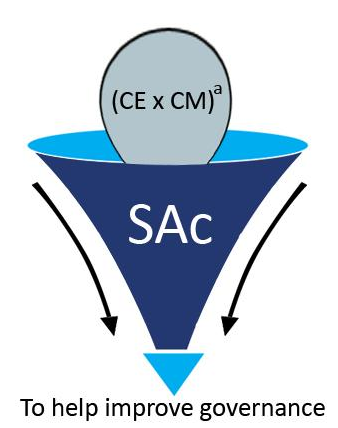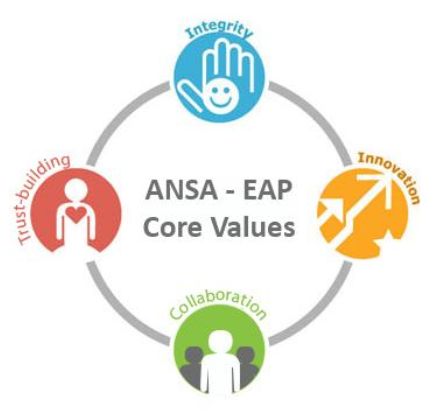
The Affiliated Network for Social Accountability in East Asia and the Pacific (Foundation) is a networking and learning facility that helps improve governance by connecting citizens and governments.
Vision:
Empowered people advancing transparent, accountable, and participatory governance
Mission:
To facilitate learning and networking among social accountability stakeholders
Core Purpose
ANSA–EAP’s core purpose is “to help improve governance” using SAc approaches and processes.
At its most basic, governance is defined as a decision-making process where decisions are turned into results. For ANSA–EAP, improving governance is a way of decision-making and implementation that aims to achieve desirable and beneficial results for both those who govern and are being governed.
There are two key actors in achieving these desirable and beneficial results: the government, on the one hand, and the citizens, on the other. While the dynamics between governments and citizens are multiple and varied (i.e. from virulent anti-corruption to passive co-optation), ANSA–EAP focuses on constructive engagement between government and citizens and gives emphasis on citizen participation in decision-making processes.
Thus, the core message that ANSA–EAP brings is social accountability—defined as the constructive engagement between citizens and government in monitoring government’s use of public resources to improve service delivery, protect rights, and promote community welfare.
Constructive Engagement
Constructive engagement is the process of building a mature relationship between two naturally opposable parties—i.e. citizens or citizen groups and government—bound together by a given reality. This process of building a mature relationship is characterized by the following:
- It involves trust-building between the two parties, i.e. builds up incentives toward partnership;
- It is evidence-based, i.e. involves collection and use of data and information;
- It is results- or solution-oriented, i.e. with concrete outcomes benefiting the people especially the poor; and
- It is a sustained and sustainable kind of engagement, i.e. towards developing mature partnerships.
As the term indicates, citizen groups and governments veer away from an adversarial or confrontational stance when they engage constructively. They focus on continuing dialogue and collaborative problem solving. Continuing dialogue means they engage in actions that involve creative inquiry, negotiation, and systematic deliberation. Collaborative problem-solving leads both parties to shared exploration for greater understanding, connection, or possibility (The Co-Intelligence Institute, 2003).
It should be emphasized, however, that while SAc prefers constructive engagement as the default mode in the governance arena, it does not preclude an adversarial or confrontational stance when circumstances dictate, such as when fighting corruption.
Citizen Monitoring
Citizen monitoring involves a range of actions in which citizens keep track of and, where appropriate, actively participate in decision-making processes leading to the same set of governance outcomes. SAc identifies these governance processes as the generation, allocation, and use of public resources. Collectively, these actions are within the Public Finance Management (PFM) cycle, which includes development planning, budgeting, expenditure management (including public procurement), and performance evaluation.
If art is the word to describe constructive engagement, to citizen monitoring belongs science. Citizen monitoring includes actions pertaining to public performance, and hence it involves data. Monitoring thus refers to systematic collection and gathering of data (including determining levels of data accessibility, availability, and integrity).
But data in and of itself is not at all useful because it is “raw… It simply exists and has no significance beyond its existence. It can exist in any form, usable or not. It does not have meaning of itself.” (Bellinger, Castro, and Mills, 2004). To be useful, data (for monitoring purposes, for example) has to be raised to a higher level—processed, analyzed, and understood—so that it becomes meaningful. Ackoff (1989) suggests that data, to be useful, should go through the transition from data to information to knowledge and finally to wisdom, with understanding supporting the process from each stage to the next. Only when data becomes useful that it becomes a platform for communication, dialogue, negotiation, and cooperation. Thus competencies in data use are important and necessary in any citizen monitoring work.
Assertiveness as an Underlying Attribute
Assertiveness is the third driver of SAc, linking constructive engagement and citizen monitoring together and helping clarify the behavioral parameters of stakeholders.
Most people are not assertive for fear of displeasing others and of not being liked. However, although you may avoid some immediate unpleasantness by not being assertive, you could also jeopardize the relationship in the long run if you refuse to assert yourself and then feel taken advantage of over and over again.
To assert is to state an opinion, claim a right, or establish authority. If you assert yourself, you behave in a way that expresses your confidence, importance or power and earns you respect from others. Assertiveness is standing up for one’s right to be treated fairly. It is expressing one’s opinions, needs, and feelings, without ignoring or hurting the opinions, needs, and feelings of others (Mountain State, n.d.)
Being assertive is different from being aggressive. Being aggressive is standing up for one’s self in ways that violate the rights of others. Aggressive behavior is typically punishing, hostile, blaming, and demanding. It can involve threats, name-calling, and even actual physical contact. It can also involve sarcasm, catty comments, gossip and “slips of the tongue” (UT–CMHC, 2011). SAc work purposely and deliberately refrains from any aggressive behavior; it strictly follows ethical standards and does not compromise governance principles.
Pulling It All Together: The Social Accountability Formula
ANSA–EAP’s message is illustrated in its formula for social accountability:

SAc = (CE x CM)a where
SAc is “social accountability”
CE is “constructive engagement”
CM is “citizen monitoring”
ais “assertiveness”
A technical understanding would show that constructive engagement compounds the outcomes of citizen monitoring, as in cases where monitoring initiatives are successfully institutionalized as long-term partnerships between citizen groups and government institutions. In the same way, citizen monitoring opens more arenas for constructive engagement through the expansion of these monitoring initiatives to other government processes, such as in the Public Finance Management cycle, procurement monitoring, and budget monitoring), or to other agencies and sectors.
Both CE and CM are fundamental to the practice of social accountability. Social accountability cannot exist if one or the other, or both, are absent (if CE or CM = 0).
The value of (CE x CM) is amplified when both are raised to the power of “assertiveness” (a). Assertiveness in social accountability is the predisposition toward advocacy for results. Being assertive moves social accountability beyond a process-oriented or mechanism-driven endeavor; the end results of constructive engagement cease to be partnership agreements, and the value of citizen monitoring lies beyond tracking for tracking’s sake. In instances where assertiveness is high, social accountability initiatives are better able to yield developmental outcomes.
Unpacking CE and CM further, one immediately sees that constructive engagement has two requisites (or competencies): sustained dialogue and collaborative problem-solving. On the other hand, because the heart of citizen monitoring is information, it (citizen monitoring) requires rigor in data gathering and data use. Thus, social accountability practitioners, whether in government or citizens, are urged to be evidence-based and to use tools and approaches that are anchored on reliable information.
The practice of social accountability in the region is redefining how citizen groups and government relate with each other. While anti-corruption will always have a place in good governance efforts in the region, social accountability provides a different, if not new, dimension by using the lens of constructive engagement through dialogue and problem-solving strategies, even as citizens monitor their governments in the use of public resources. Where applicable and appropriate, social accountability practitioners prefer the use of non-confrontational tactics and avoid finger-pointing behavior to prevent alienating government people who are regarded as crucial development partners.
Core Business
ANSA–EAP connects citizens and governments to improve governance. Its business is anchored in the organization’s identity as a “networking facility” for networks of SAc practitioners in the East Asia and the Pacific (EAP) region. As a networking facility of networks, ANSA–EAP reaches out to citizen groups (non-government organizations, civic associations, academic institutions, business sector, community-based groups), government institutions and donors. ANSA–EAP promotes the monitoring by citizens of government performance, specifically, the quality of public service delivery and the transparency of public transactions.
Networking Facility for Networks
Networking facility is “an open action network for civil society practitioners, intellectuals and researchers, collaborators, supporters and other stakeholders of SAc, providing a contact base for its advocacy and help facilitate knowledge-sharing and partnership-building.” (Parafina, 2009)
ANSA–EAP enhances and strengthens partnerships among citizen groups and between citizens and government in the EAP region. This is an important step toward building a constituency of SAc practitioners. Through existing national, regional and global partners, the ANSA–EAP network helps develop the capability of citizen groups and government to engage constructively with each other.
Building a constituency. ANSA–EAP’s constituency consists of SAc champions in various organizations including government, CSO’s and the academe; individual SAc practitioners; and organizations that embrace SAc as a core principle. Since 2009, ANSA–EAP has facilitated the establishment of National Convener Groups in Cambodia, Mongolia, Java (Indonesia), Southeast Sulawesi (Indonesia), Mongolia, Northern Luzon (Philippines), and Mindanao (Philippines). It also has helped to set-up sub-networks focusing on procurement monitoring, service delivery, extractive industries, and on budget. ANSA–EAP has also facilitated connections between its different stakeholders—governments, citizen groups and donors—to collaborate on governance initiatives guided by the principles of SAc.
Engaging constructively. The foundation for sustaining ANSA–EAP’s SAc agenda is the constructive engagement between citizens and government in monitoring and addressing issues concerning public resources. This shared agenda is strengthened through several channels, such as constant communications between and among partners, knowledge generation and knowledge sharing, policy research and evaluations, and provision of technical support to those who request it.
Knowledge and Learning Facility for Networks
ANSA–EAP harnesses SAc knowledge from local, national, and global practices and channels it to groups in EAP that require it to advance the quality of their own practice. ANSA–EAP focuses on investing in and advocating the SAc approach to key themes and sectors: public infrastructure, education, public procurement, and extractive industries. Lessons learned from and around these key themes and sectors in the network are shared with other partners in the region through capacity building activities like workshops, training, and the like.
ANSA–EAP’s facilitates knowledge sharing in the region through different forms of cross-country exchange of ideas other than capacity building. This is complemented by conducting research allowing customization of knowledge according to the context of its network partner. ANSA–EAP has able to bridge ideas and research into action allowing replication of innovative ideas in the EAP region.
Core Values
At the heart of ANSA–EAP’s work are shared values that cut across individual and organizational levels. These three values are essential to both the practice of SAc and ANSA–EAP’s work.

Integrity
At the most basic level, ANSA–EAP reveres honest action and decisions made either in the public or private sphere. In the same way that we expect government to serve with integrity, citizen advocates of SAc are expected to be honest and accountable in all aspects of their work.
This is the most basic value in ANSA–EAP and there are constant efforts to “walk the talk”. Accountability is a top guiding principle in ANSA–EAP operations. ANSA–EAP espouses accountability/transparency in dealing with its partners, making sure that mechanisms for feedback are in place.
Underlying the value of integrity is a consistent regard for SAc tenets, which include transparency and citizen participation, in one’s belief and actions.
Trust-building as an Integral Component of Partnership
Essential to any productive relationship is trust between and among partners. However, trust is not a given—especially among citizens and government.
ANSA–EAP’s work is infused with trust-building approaches that facilitate better relationships among governance stakeholders. Citizen-government partnerships are framed with the need for constructive engagement, with specific tools providing a clear framework and process. Protocols, for information disclosure and issue resolution among others—guide the actions of all parties.
To cultivate trust, ANSA–EAP brings together organized and capable citizen groups who can effectively engage in governance issues and government champions who welcome citizen participation.
Collaboration
By introducing new stakeholders into the governance equation, we make room for new ideas. Such is the wisdom of the collective that true participation allows. Collaboration, when marked by openness, allows for greater exchange of ideas and learning and complementation, or how different groups with different capacities and expertise can contribute towards common goals.
This value permeates through the different levels of ANSA–EAP’s networking functions. At the organizational level, discussions among staff are not only encouraged—they are expected. ANSA–EAP also draws from the knowledge and experience of its network in achieving its many tasks—from defining SAc in the region to crafting its priorities and implementing its projects. ANSA–EAP, through its projects, also facilitates collaboration among partner groups—its convener groups in the different countries in the region. Many of ANSA–EAP’s participatory initiatives have stemmed from collaborations with partners.
Innovation
ANSA–EAP encourages innovative thinking and provides the proper environment for it to flourish. Innovation is not only defined as having new ideas or practices. It is also about new ways of doing things, or new ways of connecting the dots. ANSA–EAP provides its staff with an environment that encourages the freedom to question and imagine—to think out of the box and to be creative in developing endeavors that put into fore the practice of SAc. This is done so new ideas and new ways to examine things are achieved.
